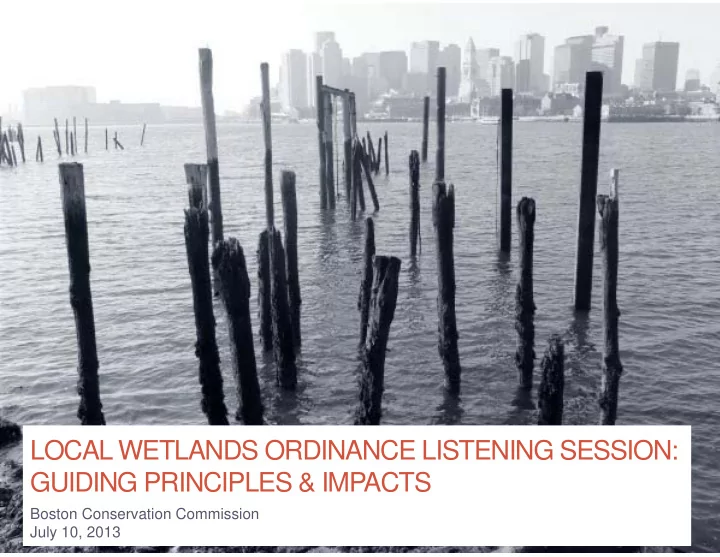

LOCAL WETLANDS ORDINANCE LISTENING SESSION: GUIDING PRINCIPLES & IMPACTS Boston Conservation Commission July 10, 2013
Why do we need a Local Wetlands Ordinance? • To protect more resource areas • To protect existing resource areas to a greater degree • To consider how future conditions will affect resource areas • Coastal municipalities in particular can benefit from a Local Wetlands Ordinance that is tailored to specific conditions. • More than half of the 351 cities and towns in MA already have a LWO. • Of the 78 municipalities in the Coastal Zone, Boston is 1 of only 6 that does not already have a LWO.
Process • Prior Public Listening Sessions: • May 1 – Kickoff • June 5 – Sea Level Rise • June 19 – Protecting Additional Functions, Values & Resources • LWO Steering Committee Submits Recommended Guiding Principles (RGPs) to Conservation Commission • ConComm Reviews and Submits RGPs to Mayor Menino • Mayor Reviews and Directs Staff to Draft LWO • Mayor Submits LWO to City Council • City Council Holds Public Hearing(s) on Proposed LWO • Upon Approval of the LWO, ConCom Develops Implementing Regulations & Holds Public Hearings
Recommended Guiding Principles 1. Protect resources against the effects of SLR. 2. Protect recreational values and plant habitat functions. 3. Protect vernal pools and isolated vegetated wetlands. 4. Create performance standards for buffer zones. 5. Improve enforcement.
Protect Resources Against SLR
Protect Resources Against SLR • Resource areas should be protected against the effects of sea level rise. • Ocean warming & ice sheet melting are projected to increase sea levels globally by 4-6.5 feet by around 2100. • In Boston we want to be prepared for 2.5 to 3 feet by 2050 • We should act on the best scientific consensus about sea level rise, as it exists today, knowing that forecasts will shift as each decade validates or causes modifications to our projections.
Protect Resources Against SLR FEMA Special Flood Hazard Zone, aka LSCSF
Protect Resources Against SLR • Land Subject to Coastal Storm Flowage (LSCSF) should be better defined and mapped. • A regulated buffer zone initially based on topographic contours should be added to LSCSF to account for future SLR. The map of this buffer zone should be revised as better information regarding sea level rise becomes available. • Performance standards should be developed for projects located within LSCSF and its buffer zone so that proponents can demonstrate how their projects are designed to take into account potential flooding caused by sea level rise and expected changes to the intensity and frequency of future storm events.
Protect Recreational Values and Plant Habitat Functions • Activities that take place along the water’s edge (hiking, birding, fishing, boating) may be negatively affected by development activity as well as sea level rise. • Certain important wildlife habitats are protected under the Act but rare plants are not; even common wetland vegetation plays a significant role in chemical cycling of elements & carbon cycling.
Protect Vernal Pools & Isolated Vegetated Wetlands • Vernal pools are temporary bodies of fresh water that provide important habitat for many vertebrate and invertebrate species. • The LWO should protect Vernal Pools, whether or not they are located within another protected resource area. Use NHESP delineation criteria.
Protect Vernal Pools & Isolated Vegetated Wetlands • The LWO should protect IVW. Wetlands that are isolated in the landscape and which do not border a surface water body are not subject to protection with only one exception (ILSF). • They should be identified using the Army Corps of Engineers’ definition, which requires the presence of 3 criteria: >50% wetland vegetation, evidence of hydrology and the presence of hydric soils.
Create Performance Standards for Buffer Zones Since work in Buffer Zones impacts resource areas, performance standards, design standards and/or other appropriate measures and safeguards should be created to better protect those resources, and their values and functions.
Improve Enforcement • Improve enforcement by using the City’s ticketing procedure to issue fines. • $300 per day via GL 40 section 21D (same as parking tickets, littering, etc.)
Impacts of LWO • Improve protection of existing resources & protect more resource areas • Help maintain biodiversity • Help retain floodwaters • Help prevent water pollution & flood damage • Require proponents to consider potential future flooding • Result in more storm-resilient projects • Reduce burden to the public by reducing pollution & storm damage • Allow better oversight of sensitive areas • Require filing by property owners not required to do so in the past • Increase the work load for ConCom & staff
Questions & Concerns… http://www.cityofboston.gov/environment/Conservation/wetlands.asp stephanie.kruel@cityofboston.gov
Recommend
More recommend